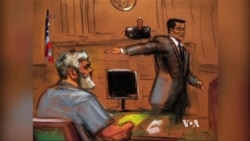NEW YORK —
The U.S. federal trial of terror suspect Abu Hamza al-Masri began Thursday in a New York courtroom where the Egyptian-born cleric faces multiple terror-related charges.
Assistant U.S. Attorney Edward Kim told the jury that the radical imam, whose birth name is Mustafa Kamel Mustafa, used his London mosque and religion as a cover to support terrorism for violent jihad.
He said Abu Hamza aided a hostage-taking in Yemen, in which four hostages were killed, helped direct a terrorist training camp in the northwestern U.S. state of Oregon, and sent men to train with al-Qaida and the Taliban in Afghanistan.
Defense attorney Joshua Dratel responded that Hamza is innocent, and that he engaged in “harsh” rhetoric merely to keep his more extreme followers from drifting away. He said Hamza’s only role in the Yemen hostage-taking was attempting to negotiate a peaceful resolution, and he noted that Hamza never traveled to Yemen or Oregon. Dratel also said that British security sometimes sought out Abu Hamza to help prevent violence among his followers.
Hamza, who says he lost an eye and both of his hands while fighting the Soviet occupation in Afghanistan, although other sources say it was in a training camp accident, was sentenced by Britain to seven years in prison in 2006 after being convicted of inciting race hatred and murder. Following a years-long legal battle, Britain extradited him in 2012 to face trial in a U.S. civil court, rather than before a military tribunal.
Seton Hall University law professor Bernard Freamon said that was the right decision.
“Of all the federal courts, this federal trial court is probably the most highly regarded,” he said. “So when you try someone, even someone accused of terrorism in a court like this, the government is under a microscope. It has to give the defendant all the rights that he deserves. That’s not so in a military trial. In a military tribunal, much is done in secret, and the defendant does not have anywhere near the due process rights that he would get here in downtown New York.”
At the same time, Freamon noted, the trial is being held within blocks of the site of the September 11, 2011 terror attacks on the World Trade Center - attacks praised by Abu Hamza.
“He had nothing to do with 9/11, at least there are no charges against him in terms of 9/11, so I think it might have been better to try him somewhere else in the United States,” Freamon said. “But the government can do that, and they think that part of the act of doing justice is to try him in the district where the terrible events of 9/11 occurred.”
The first witness in the case, Angelica Morris, testified about seeing men training with guns at an alleged jihadist training camp in the northwestern state of Oregon in 1999 and 2000. She also described witnessing a mock demonstration of how to slit someone’s throat.
Assistant U.S. Attorney Edward Kim told the jury that the radical imam, whose birth name is Mustafa Kamel Mustafa, used his London mosque and religion as a cover to support terrorism for violent jihad.
He said Abu Hamza aided a hostage-taking in Yemen, in which four hostages were killed, helped direct a terrorist training camp in the northwestern U.S. state of Oregon, and sent men to train with al-Qaida and the Taliban in Afghanistan.
Defense attorney Joshua Dratel responded that Hamza is innocent, and that he engaged in “harsh” rhetoric merely to keep his more extreme followers from drifting away. He said Hamza’s only role in the Yemen hostage-taking was attempting to negotiate a peaceful resolution, and he noted that Hamza never traveled to Yemen or Oregon. Dratel also said that British security sometimes sought out Abu Hamza to help prevent violence among his followers.
Hamza, who says he lost an eye and both of his hands while fighting the Soviet occupation in Afghanistan, although other sources say it was in a training camp accident, was sentenced by Britain to seven years in prison in 2006 after being convicted of inciting race hatred and murder. Following a years-long legal battle, Britain extradited him in 2012 to face trial in a U.S. civil court, rather than before a military tribunal.
Seton Hall University law professor Bernard Freamon said that was the right decision.
“Of all the federal courts, this federal trial court is probably the most highly regarded,” he said. “So when you try someone, even someone accused of terrorism in a court like this, the government is under a microscope. It has to give the defendant all the rights that he deserves. That’s not so in a military trial. In a military tribunal, much is done in secret, and the defendant does not have anywhere near the due process rights that he would get here in downtown New York.”
At the same time, Freamon noted, the trial is being held within blocks of the site of the September 11, 2011 terror attacks on the World Trade Center - attacks praised by Abu Hamza.
“He had nothing to do with 9/11, at least there are no charges against him in terms of 9/11, so I think it might have been better to try him somewhere else in the United States,” Freamon said. “But the government can do that, and they think that part of the act of doing justice is to try him in the district where the terrible events of 9/11 occurred.”
The first witness in the case, Angelica Morris, testified about seeing men training with guns at an alleged jihadist training camp in the northwestern state of Oregon in 1999 and 2000. She also described witnessing a mock demonstration of how to slit someone’s throat.





